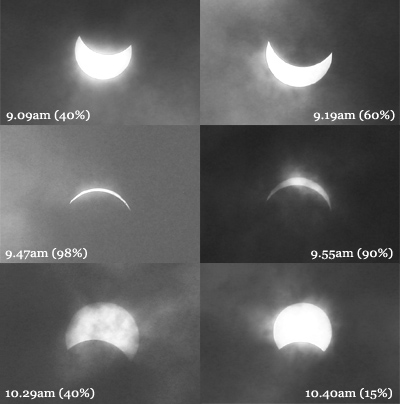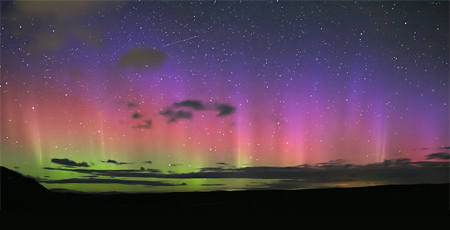
Hello, I blog!
I share all my sporadic and toilet thoughts in here, because I am random like that.
Astronomy, oh astronomy!
I’ve been reading this website called Spaceweather every single day since 2006. It’s a damn awesome site, especially if you’re an astronomy buff like me.
I’ve always been enthralled by natural phenomena, astronomy and visual effects. Think Aurora Borealis, solar eclipses, planetary conjunctions, atmospheric optics, earthquakes, volcanic eruptions and whatnot. Even the recent Eyjafjallajökull volcanic eruption (which disrupted air traffic worldwide) had me glued.
For natural visual effects – looking at photographs online is one thing, while experiencing it real-life is another thing altogether.
But why oh why do they seem to be eluding me all the time?
Last July, I travelled all the way to Shanghai (along with a flock of other eclipse-buffs from around the world that choked up all the hotels in Shanghai) in an attempt to witness the longest eclipse of the century. The sky turned out to be overcast on the day itself – with me having to contend with having the eclipse peek out occasionally through the thick layer of clouds, with the sky completely overcast during the total phase.

Phases of the July 22nd 2009 total solar eclipse, captured by me.
Even my attempt to view a partial solar eclipse here in Singapore earlier this year – January 15th – was marred by an overcast sky. Likewise, I only managed to catch glimpses – only worse. Last year’s attempt in Shanghai offered quite a number of sightings through thinner portions of clouds. This time round, I only managed to catch one. miserable. glimpse.
Seeing how last year’s attempt to witness a total solar eclipse was foiled by bad weather, it still remains at the top of my ‘want to see’ list – right up there with the Aurora Borealis (also known as the Northern Lights).
2003-2004 was the previous solar maximum period, or so I recall. Back then, astronomy forums and websites were flooded with deluges of breathtaking Aurora Borealis photos. While the higher-latitude dwellers revelled in colourful night skies, I sat in front of my square monitor – wistfully browsing through such photos – on this sunny island called Singapore which was too close to the equator to witness anything as cool as that.
Solar maximum (in layman terms) is the period of the solar cycle where there is the most solar activity, or sunspots on the sun. These sunspots erupt, directing rays of magnetism and radiation towards Earth. This interferes with the Earth’s natural magnetic field at the poles, resulting in Aurora Borealis.

The Aurora Australis in New Zealand captured by Grant Bisset.
(Photo from Spaceweather.)
I’m travelling upward to Canada and Alaska later next month.
Hopefully, the sun will go bonkers sometime around then so that I’d be able to witness some Northern Light activity.
I’m not into astronomy simply for the visual effects. For something as beautiful as the Aurora Borealis, there are science and physics theories driving it – which I read about in my free time. There are also loads of other awesome scientific stuff about astronomy that can boggle your mind.
Thankfully, there are ample astronomy facts, phenomena and theories (as well as coverages of recent astronomy-related events waa-laah!) that I can sink my teeth into. I need stuff like these to keep my brain entertained.
I found this link a couple of years back – The Once and Future Sun. It may seem boring for those who have no interest in astronomy. But otherwise, it is a fairly simple-to-understand website with information that might blow you away – and also accounts for one possible theory of how the world will end.
Oh yes – if you’re interested – a space telescope dispatched to study the sun (known as the NASA Solar Dynamics Observatory) has recently beamed back the first few pictures (and videos) of our star. If you want to see more awesome pictures of celestial bodies (not the female kind, though), proceed here.